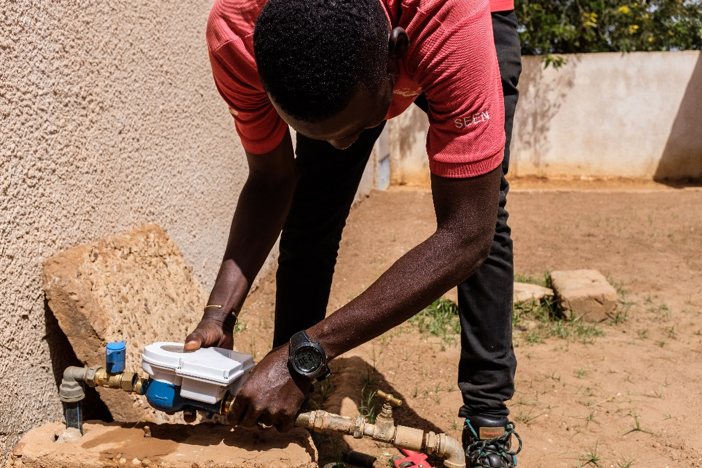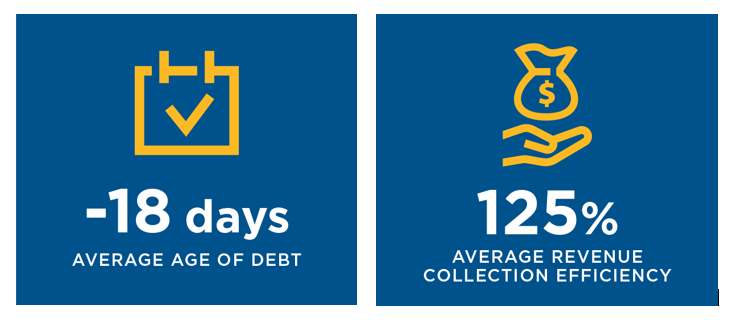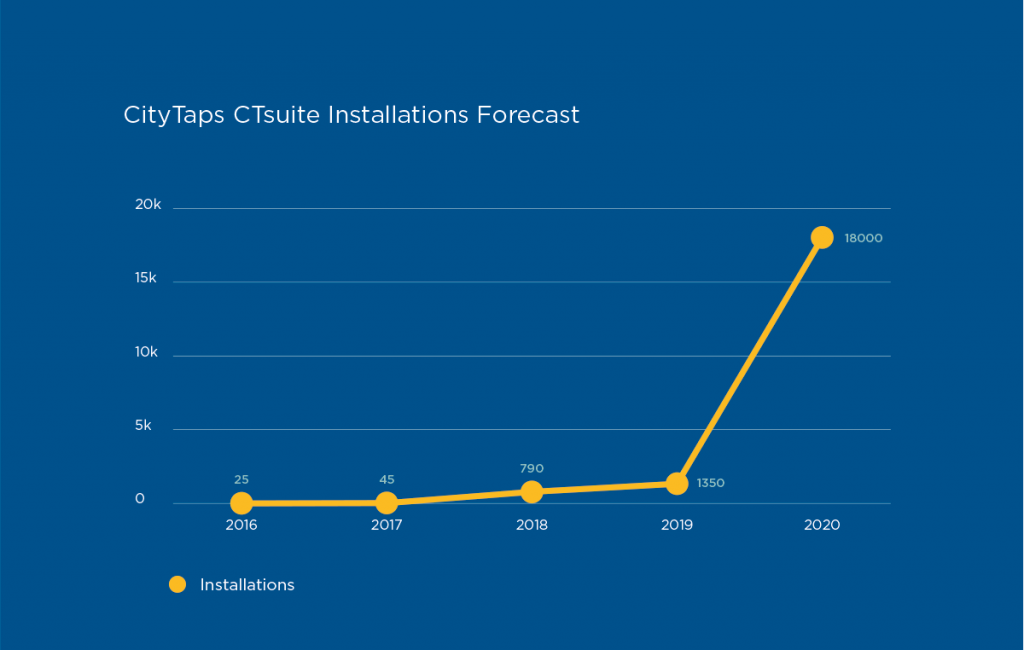Globally, nearly a billion people living in urban areas lack access to running water at home. Cash-strapped water utilities struggle to serve these people while grappling with poor revenue collection efficiency, high water losses and billing inaccuracies. The urban poor suffer in the end by having to pay a triple tax on poverty in time, health and money. The problem is further compounded by Africa`s rapid urbanization with the continent’s urban population expected to more than double by 2040, this will increase demand for water while creating a strain on existing water resources and infrastructure.
CityTaps provides one of the most promising solutions that lets 1) low-income urban populations pre-pay for household water consumption and 2) enables water utilities to have more water and financial resources to efficiently serve more people. The GSMA M4D Utilities Innovation Fund awarded CityTaps a grant in 2015 to deploy the smart prepaid meters in Niamey, Niger, in partnership with the local water utility, Société d’Exploitation des Eaux du Niger (SEEN) and Orange Niger. In 2018, CityTaps received another GSMA grant to continue scaling this service in Niamey deploying 1,325 smart meters.
This solution is called CTSuite and it combines a smart and prepaid water meter (CTMeter) and an integrated software management system (CTCloud) that processes pay-as-you-go (PAYG) payments through mobile money. With CTSuite, subscribers enjoy running water at home and use mobile money to credit their “water balance” – for any amount, at any time, with any phone – automatically opening water access in the PAYG meter via LoRa connectivity. It allows new subscribers to be connected without risk to the utility (as they are prepaid) and users who were previously disconnected due to high arrears to reconnect to utility networks and make small daily micropayments towards their accrued debt. The prepaid water meter transfers payments in real-time so that water utilities can improve their cash flow and balance sheets. These utilities enjoy better revenue collection leading to the financial health needed for them to expand coverage to new low-income subscribers that previously would have been seen as too risky.
CityTaps recently completed their GSMA grant – successfully installing 1,325 smart meters and reaching over 10,500 beneficiaries. The grant achieved the following results:
Commercial benefits: Proven business case for prepaid smart meters
SEEN’s revenue collection efficiency with CTSuite exceeds 100% because the water service is paid in advance. During the grant, SEEN was paid 18 days in advance on average; a huge improvement compared to previous operations collecting post-paid domestic invoices 6 months after issuance. This shows the potential of CityTaps’ solution to help water utilities become more financially sustainable.
Mobile benefits: Strong mobile money usage
Orange Niger provides the platform for payments for the CityTaps service as customers could make payments of any amount. All transactions are made through Orange Money platform. Our endline study revealed the following quantifiable benefits for Orange Niger, and for financial inclusion of customers:
- New Mobile Money Customers: 43 per cent of customers became new mobile money users.
- New Orange Money Customers: 15 per cent of CityTaps’ customers have become new Orange money customers as a result of the service.
- Increased Use of Mobile Money: 95.5 per cent of the customers who used mobile money before CityTaps say they have increased their mobile money usage as a result of the CityTaps solution.
During the grant, CityTaps also successfully negotiated the introduction of a new mobile money tariff with Orange Niger: a water purchase of 500 – 1,000 CFA has a transaction fee of 50 CFA, instead of 100 CFA, as applies to other Orange Money transactions of this amount. This enabled customers to make small but frequent top ups for the CTmeter without paying high transaction fees (Read our blog on Mobile money transaction fees and utility bill payments in emerging markets).
Solving the triple poverty tax: Improving the lives of the urban poor
Subscribers who relied on alternative sources of water before CityTaps used to pay a triple tax on poverty in money, time and health. New subscribers save up to 94 per cent per cubic meter of water consumed. The regulated SEEN water price is $0.21 US per cubic meter and is up to 16 times cheaper than the price of alternative water sourced from ‘garouas’ — pushcart vendors. This makes accessing water affordable for the urban poor and enables them to use their income for other uses.
| “The meter SEEN Dey Dey allowed us to have a healthy and clean water and thus the improvement of our living condition.”
SEEN Customer |
Our endline survey also revealed huge time savings for new subscribers. While they used to wait an average of nearly 1.5 hours per day to obtain water from water delivery services, they now only take an average of 7 minutes to top up water credit with the CityTaps system, meaning they gain 86 minutes every day to pursue other activities.
Finally, CityTaps customers also reported improved perceptions on health with customers reporting less digestive and skin diseases since they started drinking piped water from the utility.
Evolving Business Models: PAYG leasing model
For cash-strapped utilities acquiring innovative technologies can be very expensive. To help bring running water to every urban home, the CityTaps technology alone is not enough. In reality, CAPEX-poor utilities cannot afford the technology at scale on their own. CityTaps enables the scalability and the sustainability of the water PAYG business model by offering the smart PAYG water solution through a leasing model to water utilities. The upfront CAPEX costs are replaced by lease payments over time. The upfront fee is paid by investors whose investments are de-risked by the PAYG technology. It unlocks private capital by creating a direct link between subscriber payments and utilities’ lease repayment through the lease company to the investors. This ensures immediate and transparent cash collection that reduces default and delayed account receivables. Through PAYG, water utilities can assure cost recovery of the smart meter hardware and software, in order to access the service immediately in order to break the vicious cycle of declining revenues and declining service levels. Utilities can leverage these cash flows to invest in future expansion plans.
CityTaps is currently trialling its service in Burkina Faso in partnership with Orange Burkina Faso. Orange is trialling over 200 meters in Ouagadougou in partnership with the national water service provider, the Office National de l’Eau et de l’Assainissement (ONEA). In this PAYG approach, Orange is purchasing the hardware and leasing it to the water utility.
Scaling to new markets
CityTaps is expanding their service within Niger and into new markets such as Burkina Faso, Mali, Senegal and Kenya. Based on the success of the grants with GSMA, SEEN the water utility in Niamey, has ordered 10,000 CTsuites. This deployment is estimated to be completed in 2020 and will impact nearly 100,000 beneficiaries.
CityTaps has received an investment of $500,000 from Global Innovation Fund and raised € 2.2 million from several impact investors. CityTaps has also secured €1 million from various grants to begin projects testing the PAYG leasing model in Mali with Société Malienne de Gestion de l’Eau Potable (SOMAGEP) and in Kenya with Malindi Water & Sewerage Company (MAWASCO).
In 2020, CityTaps is planning to scale up to deploy 18,000 CTSuites. The company is also planning to raise a debt instrument of €2 – 5 million to continue rolling out its PAYG leasing business model to utilities and reach two million people by 2022.
The GSMA Mobile for Development (M4D) Utilities programme is funded by the UK Department for International Development (DFID), USAID as part of its commitment to Scaling Off-Grid Energy Grand Challenge for Development and supported by the GSMA and its members.






